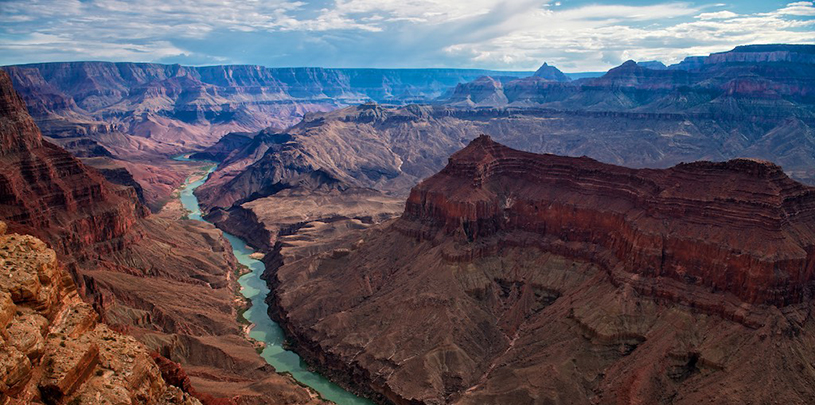
 by Roger Clark, Grand Canyon Director
by Roger Clark, Grand Canyon Director
“Wow, we can’t believe this is happening all over again,” the Save the Confluence families, who have been fighting against the proposed Grand Canyon Escalade development for the past six years, are saying.
Evidence is everywhere that Escalade developers are pushing Navajo legislators hard to approve a tourist resort and tramway to deliver 10,000 people a day to the bottom of the Grand Canyon.
And to Save the Confluence, this is a jolt of déjà vu.
In the months leading up to the 2014 Navajo Nation’s Council summer legislative session, Escalade lobbyists were asking delegates to sponsor legislation that would jumpstart the development. But because of controversy surrounding Escalade, the delegates wouldn’t touch the issue, and no bill was ever introduced.
Fast forward to the months leading up to the 2016 summer legislative session, and it’s a similar story.
But this time, Escalade lobbyists have found a delegate to introduce a bill in support of the project and have submitted it for review by the legislative counsel. It has yet to be introduced and made public, despite having secured support from several powerful delegates on the 24-person council. Insiders say the new legislation contains many of the same objectionable provisions as the previous bill and master agreement.
On June 15, Save the Confluence took the issue to the airwaves, broadcasting a live two-hour forum on the popular radio station KTNN, The Voice of the Navajo Nation.
Mostly in Navajo with a bit of English mixed in, the show was a hit. And before Save the Confluence even got off the air, they had listeners showing up at the station in Window Rock asking what they could do to help.
Rita Bilagody, a longtime community organizer, began with a history lesson about the Bennett Freeze and its effect on the Navajo people. Two decades ago, she and her brother Frank organized the Forgotten People to fight for displaced residents' rights to return to their homes.
Delores Wilson-Aguirre, a founder of Save the Confluence, spoke of her childhood growing up on the land that Escalade would destroy—the land her 10 brothers and sisters call home.
Franklin Martin, a retired Navajo Generating Station worker who now runs his own business called Sacred Edge Tours, spoke next about his family's long relationship with the Bodaway outback.
The conversation then turned to a discussion of support for locally-owned businesses, community-based planning, and bottom-up financing in partnership with non-profit and social equity investors.
Larry Foster, a former Green Beret and veteran of the Vietnam War, wrapped up the radio program by explaining why the confluence is important to all veterans. As a young man, Larry learned from his grandfather about the confluence, a place where the male and female rivers meet with powers to heal and protect through prayer and respect. He participated in ceremonies where the confluence played a central role before and after his deployment to war.
Foster stated three reasons why he’s against Escalade:
He ended in English, with a challenge to Navajo lawmakers to honor relationships that veterans, local ranchers, and residents have with the land that developers intend to turn into a “Disneyland park.” This, he said, must never happen.
On hand to assist at the radio broadcast were Renae Yellowhourse, the principal Save the Confluence spokesperson to local, national, and international media, and Sarana Riggs, who is assisting in the current campaign to stop pro-Escalade legislation from being approved by the Navajo Nation Council.

(Save the Confluence members on KTNN in Window Rock. From left to right: Sarana Riggs, Renae Yellowhorse, Larry Foster, Franklin Martin, Deon Ben, Delores Wilson-Aguirre, Rita Bilagody.)
During the legislative push in 2014, Escalade developers had strong support by then President Ben Shelly. But with last year’s election of Russell Begaye, who campaigned against Escalade, lobbyists must gain the votes of 16 delegates, two-thirds of the council, to override a presidential veto.
Save the Confluence family members and supporters are organizing more public programs to keep educating Navajo citizens and their elected officials about Escalade’s threats. If the legislation is officially introduced, we’ll post a link for the public to comment during the five-day period after it drops. In the meantime, please follow Save the Confluence on Facebook for timely updates.
80% of Arizona voters support Baaj Nwaavjo I'tah Kukveni National Monument, according to a new poll.
Read MoreUtah voters strongly support national monuments in general, and Bears Ears and Grand Staircase-Escalante in particular, a new poll shows.
Read MoreA small victory in the legal case challenging Daneros uranium mine, near Bears Ears National Monument.
Read More